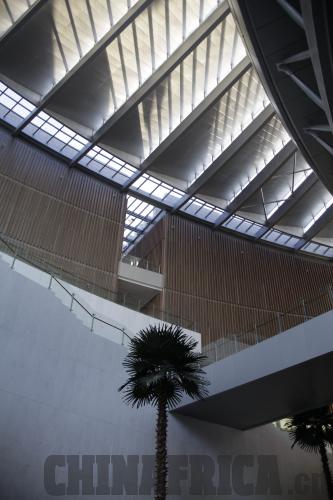|

Unfortunately, efficient timetables can't save everything. Late last March, two containers of glass were damaged in a traffic accident as they were being transported from a port in Djibouti to Addis Ababa. "It took four to six months from product processing and inspection for a shipment to arriving at the port, [so] it was an urgent situation," recalled Song. "We re-customized the glass in Chinese factories and shipped them back to Addis Ababa by air. Luckily the glass arrived just in time, and we finished the exterior construction work before the rainy season [began]. The costs certainly increased, but to guarantee smooth construction we had to do it this way."
Building commenced in the summer of 2009 and was completed at the end of 2011. During the two and a half years of construction, the team experienced three rainy seasons - equivalent to almost a full year of rain in total. Song had to adjust the workflow on-site accordingly.
"To pave the [complex's] square during the rainy season, we did the concrete hardening in advance," he said. "The cost increased, but we saved time on landscaping work." Workers still had to pave the 20,000-square-meter granite square in the rain, and Song was quite touched by their efforts.
Creating precedents
More than anything, the Chinese Government wanted the project to run smoothly. Drawing on six decades of foreign aid experience, it was decided that the Ministry of Commerce would send a special full-time councilor to oversee the construction. His name was Zeng Huacheng.
As the first government representative in China's foreign aid history, Zeng worked day and night at the AU site. He's only in his 40s, but his hair is fully gray. He chalked it up to completing the high-quality aid project. "We created a lot of precedents," he said. He has been involved in aid work for 20 years.
The first of these precedents is a sample sealing mechanism, which dictates that equipment and materials are only sealed after all parties confirm their satisfaction. This include the designer, construction contractor, supervising manager, and the owner. "This is what we learned from other industries," said Zeng. "We took this approach to control the quality of the building from the very beginning."
|